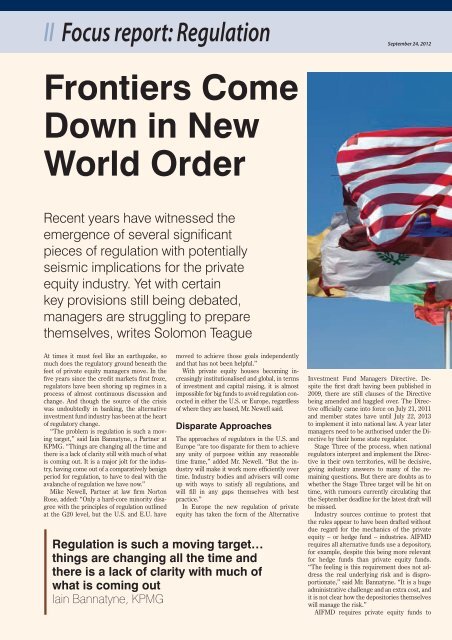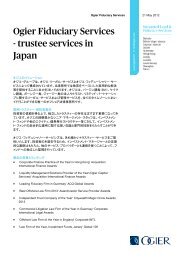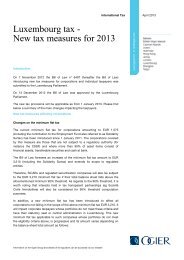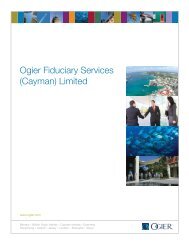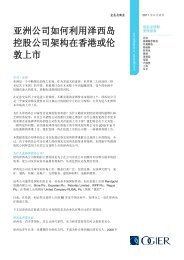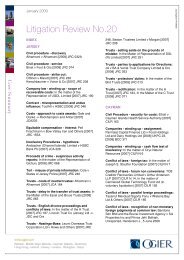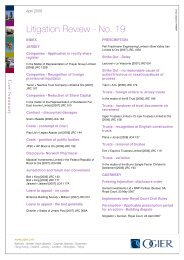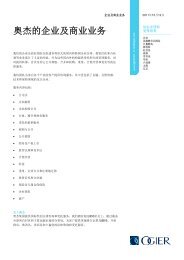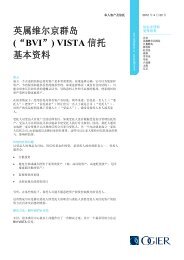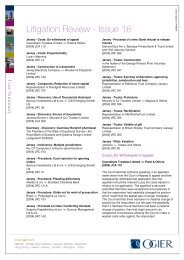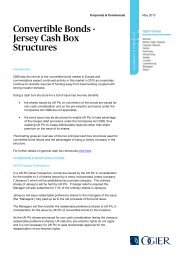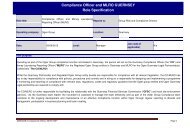Focus Report on Regulation - Going through a seismic shift - Ogier
Focus Report on Regulation - Going through a seismic shift - Ogier
Focus Report on Regulation - Going through a seismic shift - Ogier
Create successful ePaper yourself
Turn your PDF publications into a flip-book with our unique Google optimized e-Paper software.
II <str<strong>on</strong>g>Focus</str<strong>on</strong>g> report: Regulati<strong>on</strong><br />
September<br />
24, 2012<br />
Fr<strong>on</strong>tiers Come<br />
Down in New<br />
World Order<br />
Recent years have witnessed the<br />
emergence of several significant<br />
pieces of regulati<strong>on</strong> with potentially<br />
<strong>seismic</strong> implicati<strong>on</strong>s for the private<br />
equity industry. Yet with certain<br />
key provisi<strong>on</strong>s still being debated,<br />
managers are struggling to prepare<br />
themselves, writes Solom<strong>on</strong> Teague<br />
At times it must feel like an earthquake, so<br />
much does the regulatory ground beneath the<br />
feet of private equity managers move. In the<br />
five years since the credit markets first froze,<br />
regulators have been shoring up regimes in a<br />
process of almost c<strong>on</strong>tinuous discussi<strong>on</strong> and<br />
change. And though the source of the crisis<br />
was undoubtedly in banking, the alternative<br />
investment fund industry has been at the heart<br />
of regulatory change.<br />
“The problem is regulati<strong>on</strong> is such a moving<br />
target,” said Iain Bannatyne, a Partner at<br />
KPMG. “Things are changing all the time and<br />
there is a lack of clarity still with much of what<br />
is coming out. It is a major jolt for the industry,<br />
having come out of a comparatively benign<br />
period for regulati<strong>on</strong>, to have to deal with the<br />
avalanche of regulati<strong>on</strong> we have now.”<br />
Mike Newell, Partner at law firm Nort<strong>on</strong><br />
Rose, added: “Only a hard-core minority disagree<br />
with the principles of regulati<strong>on</strong> outlined<br />
at the G20 level, but the U.S. and E.U. have<br />
moved to achieve those goals independently<br />
and that has not been helpful.”<br />
With private equity houses becoming increasingly<br />
instituti<strong>on</strong>alised and global, in terms<br />
of investment and capital raising, it is almost<br />
impossible for big funds to avoid regulati<strong>on</strong> c<strong>on</strong>cocted<br />
in either the U.S. or Europe, regardless<br />
of where they are based, Mr. Newell said.<br />
Disparate Approaches<br />
The approaches of regulators in the U.S. and<br />
Europe “are too disparate for them to achieve<br />
any unity of purpose within any reas<strong>on</strong>able<br />
time frame,” added Mr. Newell. “But the industry<br />
will make it work more efficiently over<br />
time. Industry bodies and advisers will come<br />
up with ways to satisfy all regulati<strong>on</strong>s, and<br />
will fill in any gaps themselves with best<br />
practice.”<br />
In Europe the new regulati<strong>on</strong> of private<br />
equity has taken the form of the Alternative<br />
Regulati<strong>on</strong> is such a moving target…<br />
things are changing all the time and<br />
there is a lack of clarity with much of<br />
what is coming out<br />
Iain Bannatyne, KPMG<br />
Investment Fund Managers Directive. Despite<br />
the first draft having been published in<br />
2009, there are still clauses of the Directive<br />
being amended and haggled over. The Directive<br />
officially came into force <strong>on</strong> July 21, 2011<br />
and member states have until July 22, 2013<br />
to implement it into nati<strong>on</strong>al law. A year later<br />
managers need to be authorised under the Directive<br />
by their home state regulator.<br />
Stage Three of the process, when nati<strong>on</strong>al<br />
regulators interpret and implement the Directive<br />
in their own territories, will be decisive,<br />
giving industry answers to many of the remaining<br />
questi<strong>on</strong>s. But there are doubts as to<br />
whether the Stage Three target will be hit <strong>on</strong><br />
time, with rumours currently circulating that<br />
the September deadline for the latest draft will<br />
be missed.<br />
Industry sources c<strong>on</strong>tinue to protest that<br />
the rules appear to have been drafted without<br />
due regard for the mechanics of the private<br />
equity – or hedge fund – industries. AIFMD<br />
requires all alternative funds use a depository,<br />
for example, despite this being more relevant<br />
for hedge funds than private equity funds.<br />
“The feeling is this requirement does not address<br />
the real underlying risk and is disproporti<strong>on</strong>ate,”<br />
said Mr. Bannatyne. “It is a huge<br />
administrative challenge and an extra cost, and<br />
it is not clear how the depositories themselves<br />
will manage the risk.”<br />
AIFMD requires private equity funds to


